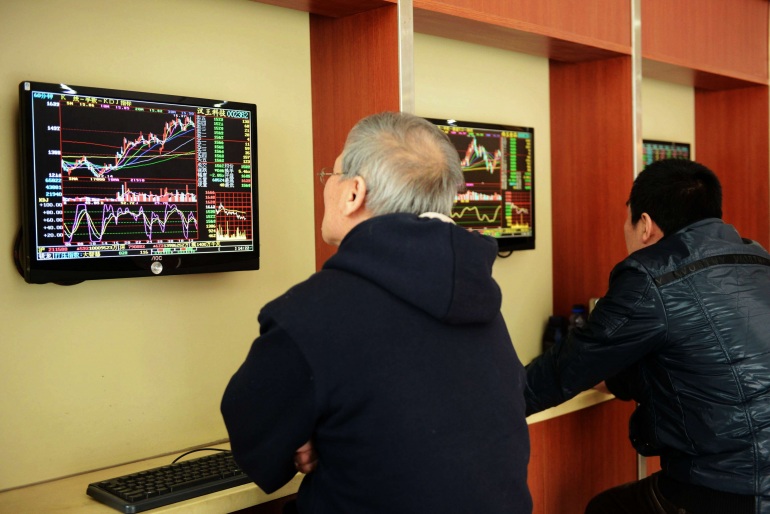Moral hazard spells disaster for China

Chinese investors look at stock indices at a stock brokerage house in Qingdao city, east China's Shandong province. (AP photo)
Before the implosion of the global financial system, US investment banks made a killing out of selling diced and re-packaged sub-prime mortgage products to millions of unsuspecting investors around the world.
Investors, including Australian local councils, placed their faith in the triple-A imprimatur endowed by credit rating agencies. Five years after the GFC, big Chinese state-owned banks are engaging in eerily similar activities, peddling high interest trust products (private wealth management products) to investors around the country in return for high fees.
Chinese investors are placing their trust in these high-interest trust products because of the implicit guarantee that the government – the ultimate owner of all big state-owned banks – would play the role of a knight in shining armour to rescue them all.
As a result, in the past few years there has been a proliferation of trust products that form part of China’s growing shadow banking sector. Experts estimate the size of the trust industry to be about 18 per cent of China’s GDP, or 10 trillion Yuan.
These trust products typically have maturity of three years, with annualised returns of ten per cent. Though these products have been marketed as low-risk private wealth management products, in essence they are high-yield corporate junk bonds.
When the Chinese economy was growing strongly at double digits, there was little concern about the ability of issuers of these trust products to repay their debts plus high interests. However, the Chinese economy has de-accelerated sharply in the past two years and casts doubt on their repayment ability.
Just before the Chinese New Year, one of the largest trust funds, worth three billion yuan, was facing the imminent prospect of default. The Industrial and Commercial Bank of China, a trust company and the local provincial government collectively bailed out the fund and repaid investors in full. (China’s Bear Stearns moment, 29 January.)
Their action exemplifies the problem of moral hazard in China. Many investors knowingly ignore one of the most fundamental principles of investment – high risk, high returns – and plunge their money into high yield trust products safe in the knowledge that the government would bail them out if things turn sour.
Their expectations have been proven right again and again, including the large bailout just before the Chinese New Year. It has been estimated that Beijing rescued more than a dozen smaller trust funds in 2013 in order to avoid a panic in the market.
In China, it seems the moral hazard of ‘too big to fail’ has been tweaked to ‘too small to fail’. The bailouts can temporarily avert panic in the financial market, but the costs to financial reform and broader economic structural transformation are huge.
It is almost impossible for the market to price risk if people expect the government to pick up the tab in the end. It will only encourage further reckless investment behaviour and store up bigger trouble for the Chinese financial system in the future.
More than half of all trust products on the market have to be redeemed within the next two years and default will happen unless Beijing decides to issue a blanket guarantee to everyone. How to manage the inevitable default is one of the biggest challenges facing Chinese officials.
Andy Xie of Rosetta Stone Advisors, China’s own Nouriel Roubini, has offered a sensible battle plan to address the fast growing problem.
Firstly, Chinese banks must bear higher costs in bailouts. So far, they typically offload failing investments to third party state-owned asset management companies. In the future, Chinese banks must contribute the equivalent of five to 10 times the commissions they earn from selling trust products to their customers to the bailout fund. Banks typically earn between four and eight per cent commissions on the products they sell.
Secondly, the so-called trust companies that issue high-yield products must be treated as brokerage firms that sell corporate junk bonds and they should not be allowed to market their products as low-risk private wealth products.
Thirdly, investors need to take the necessary haircut in the event of default and they should not expect to be repaid in full by the government.
The slow traditional Chinese medicine approach – the one preferred by the Chinese central bank – may not be enough to cure the worsening sickness of accumulating debt. It is time to contemplate the surgical option of removing the rotting part to avoid further contagion.
Follow Peter Cai on Twitter: @peteryuancai
Subscribe to the China Spectator newsletter: http://bit.ly/ChinaSpec
















